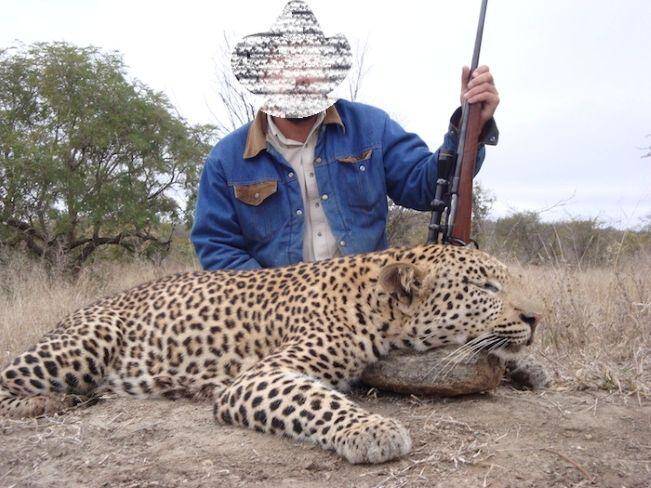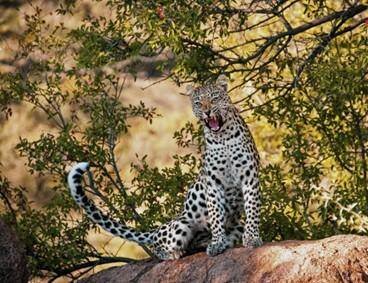Leopards are among Africa’s most elusive and skilled predators, known for their stealth and adaptability. Understanding when these remarkable animals hunt offers insight into their behavior and enhances the experience of tracking them on a safari. Their hunting patterns are shaped by factors like habitat, prey availability, and the need to avoid competition with other predators.
Typically, leopards are nocturnal hunters, using the cover of darkness to their advantage. However, their behavior can vary depending on the environment and circumstances. Observing a leopard in action is a rare and unforgettable moment, showcasing their agility and precision in the wild. For those drawn to the thrill of African game safaris, learning about leopard hunting habits adds depth to the adventure and appreciation for these magnificent creatures.
[DYNAMIC-BLOGTABLEOFCONTENT]
Key Takeaways
-
Leopards are primarily nocturnal hunters, leveraging their stealth and night vision to ambush prey between dusk and dawn.
-
Hunting patterns vary based on environmental factors, such as habitat, prey availability, and competition from other predators.
-
Leopards exhibit adaptability, occasionally hunting during dawn, dusk, or daytime depending on weather conditions, seasonal changes, or prey behavior.
-
These predators prefer medium-sized prey but are opportunistic hunters capable of adjusting their strategies to suit available resources.
-
Human activity can significantly influence leopard hunting behavior, often pushing them to hunt at night in high-traffic areas.
-
Understanding leopard hunting habits enhances wildlife observation experiences and deepens appreciation for their elusive and versatile nature.
Leopard Hunting Overview
Leopards, known for their elusive nature, exhibit exceptional stealth and precision when hunting. Their ability to adapt to diverse habitats makes them one of Africa’s most versatile predators. Typically, leopards hunt during the night, employing their sharp senses and camouflaged coat to ambush prey silently. They often prefer areas with plenty of cover, such as dense bushes and rocky terrains, reducing the likelihood of detection.
Although leopards are primarily nocturnal, they sometimes adjust their hunting routines. For instance, in areas with limited nighttime visibility or intense competition from other predators, they may hunt during dawn or dusk. This adaptability is essential for their survival, particularly in regions where prey availability fluctuates.
Prey selection showcases their remarkable hunting skills. Leopards often target medium-sized animals, like impalas or warthogs, but they are opportunistic hunters capable of taking down larger or smaller game. They rely on a combination of strength and strategy, using powerful claws and jaws to secure their prey.
Leopard hunting in Africa offers an unforgettable glimpse into the predator-prey dynamics of the savannah. Observing their calculated movements during a hunt reveals why leopards hold such a revered spot in African game hunting. For enthusiasts considering leopard hunting packages, understanding these patterns ensures a profound appreciation for the species’ behavior and the challenge of tracking them in their natural habitat.

Factors Influencing Leopard Hunting Times
Leopard hunting behavior depends on several dynamic factors, making their patterns difficult to predict but fascinating to explore. Understanding these influences benefits both enthusiasts and those interested in leopard hunting packages in Africa.
Habitat And Geography
Leopards tend to adapt their hunting times based on their habitat and geographical challenges. In dense forests or bushlands, where visibility is low, they often hunt at night, leveraging their stealth and keen night vision. However, in open savannahs, they may adjust to crepuscular hunting, targeting prey during dawn or dusk to avoid competitors. Regions with rocky terrains provide ample cover for ambushes, which allows leopards to remain concealed from both prey and larger predators.
Prey Availability
The abundance and type of prey heavily impact leopard hunting schedules. In areas with a high density of medium-sized game, like impalas or gazelles, their hunting success rate increases during nocturnal hours. When prey is scarce or primarily diurnal, they might change their behavior, seeking opportunities during daylight hours. Opportunistic by nature, leopards in prey-rich zones also store kills in trees, reducing scavenging risks.
Weather And Season
Weather and seasonal changes significantly alter leopard hunting behavior. During the rainy season when grass and vegetation grow thicker, they hunt more during the day, using the cover to their advantage. In the dry season, prey animals often gather near water sources, influencing leopards to target these areas. Extreme weather, like heatwaves or storms, can also shift their hunting schedules temporarily to cooler or less turbulent times of the day.

Typical Hunting Patterns Of Leopards
Leopards exhibit unique hunting behaviors that set them apart from other predators. Their strategies adapt to environmental factors, prey availability, and external pressures, allowing them to thrive across diverse African landscapes.
Daytime Vs Nighttime Hunting
Leopards are primarily nocturnal hunters, leveraging darkness for stealth and element of surprise. They often hunt between dusk and dawn, when their acute night vision gives them a distinct advantage. This preference minimizes competition with diurnal predators like lions and reduces exposure to human activity.
Daytime hunting occurs less frequently but is not uncommon. In some cases, leopards hunt during early dawn or late dusk, especially in open environments like savannahs where they must evade other predators. Seasonal changes can also influence timing—thicker vegetation during rainy months may encourage more daytime hunting, while prey clustering near scarce water sources in dry seasons may drive activity during daylight hours.
Impact Of Human Activity
Human presence significantly affects leopard hunting behavior. In areas of higher human activity, leopards tend to hunt at night to avoid interaction and reduce the risk of disturbance. This adjustment is most noticeable around villages, settlements, or regions where anti-predator measures are in place.
Conversely, in protected zones or undisturbed habitats, leopards can exhibit more natural hunting patterns. Tracking a hunting leopard in such areas provides a rare glimpse into their undisturbed behavior, highly valued by enthusiasts of leopard hunting in Africa. Understanding the impact of human activity on their behavior aids in the planning of ethical game hunting experiences or leopard hunting packages.
Comparison With Other Big Cats
Leopards exhibit unique hunting behaviors compared to other big cats. Their adaptability and stealth set them apart, allowing them to thrive across various landscapes, from dense forests to open savannahs.
Leopards Vs Tigers
Leopards and tigers differ significantly in hunting strategies due to variations in size, habitat, and prey preferences. Leopards rely on stealth and quick ambush tactics, favoring medium-sized prey like impalas or bushbucks. Tigers, being much larger, often target bigger animals such as deer or wild boars. While leopards are adept climbers, frequently dragging prey up trees to avoid scavengers, tigers primarily hunt on the ground. Tigers, solitary like leopards, also exhibit nocturnal hunting patterns but occupy distinct territories in dense jungles and wetlands.
Leopards are more versatile in habitat selection, unlike tigers, which are restricted to forested and swampy regions. This adaptability makes leopard hunting in Africa a distinct experience compared to tiger-tracking in Asia. Additionally, leopards face competition from multiple predators like lions and hyenas, unlike tigers, whose size and strength often make them apex predators.
Leopards Vs Lions
Leopards and lions both inhabit overlapping African ecosystems, yet their hunting methods contrast sharply. Leopards specialize in solitary hunting, using cover for ambushes, whereas lions often rely on group strategies to outmaneuver prey. Lions, as apex predators, typically dominate the savannah by targeting large prey, including zebras and buffalo, which leopards lack the size to pursue.
Leopards, avoiding direct competition, hunt smaller animals and rely on their ability to climb trees for safety and food storage. These skills are particularly advantageous in areas where scavengers like hyenas are present. While lions are predominantly diurnal, leopards hunt more during nighttime to reduce encounters. This distinction is evident when observing leopard hunting in Africa, as it underscores their need for stealth and independence within a shared environment.
Conclusion
Leopards are extraordinary predators whose adaptability and stealth set them apart in the animal kingdom. Their ability to adjust hunting times and techniques based on environmental factors highlights their resilience in diverse habitats. Whether hunting under the cover of night or during the quiet hours of dawn, leopards showcase unmatched precision and independence.
Understanding their hunting behavior not only deepens our appreciation for these majestic animals but also enhances wildlife experiences for enthusiasts and conservationists alike. Observing a leopard’s calculated movements is a rare privilege that underscores their role as one of Africa’s most iconic predators.
Frequently Asked Questions
What factors influence leopard hunting behavior?
Leopard hunting behavior is influenced by habitat, prey availability, competition with other predators, weather conditions, and human activity. These adaptable predators adjust their times and locations to optimize their chances of catching prey and avoiding danger.
Do leopards prefer hunting during the day or night?
Leopards are primarily nocturnal hunters, using darkness for stealth. However, they may hunt during dawn, dusk, or even daytime, depending on environmental factors like competition, vegetation, and seasonal changes.
What types of prey do leopards hunt?
Leopards typically target medium-sized animals such as impalas, warthogs, and antelope. They are opportunistic hunters and can also prey on smaller animals or take down larger game when necessary.
How does human presence affect leopard hunting behavior?
Leopards tend to become more nocturnal in areas with high human activity to avoid disturbances. In protected habitats, their hunting patterns are more natural, offering better insights into their behavior.
How do leopards differ from lions in their hunting methods?
Leopards hunt alone, relying on stealth and ambush tactics, while lions hunt in groups and often target larger prey. Leopards avoid direct competition with lions by focusing on smaller prey and using their climbing skills.
Where are leopards most likely to hunt?
Leopards prefer areas with dense vegetation, rocky terrains, and ample cover for ambushing prey silently. Habitats vary from forests to savannahs, showcasing their adaptability across diverse environments.
What makes leopard hunting behavior unique?
Leopards are exceptionally stealthy and versatile hunters. They utilize their agility, precision, and ability to adapt to different environments, which sets them apart from other predators like lions and tigers.
How does prey availability impact leopard hunting patterns?
In prey-rich areas, leopards often hunt at night to minimize competition. Scarce prey or seasonal changes may lead them to adjust their patterns, such as hunting during the day or near water sources.
Can leopards adapt to human-modified environments?
Yes, leopards are highly adaptable. In areas with significant human activity, they adjust their hunting times to avoid conflict, often becoming fully nocturnal to remain undetected.
Why are leopards harder to observe during hunts?
Leopards are elusive and rely heavily on stealth. Their calculated, solitary hunting methods and preference for dense cover make observing them in action a rare and rewarding experience.
